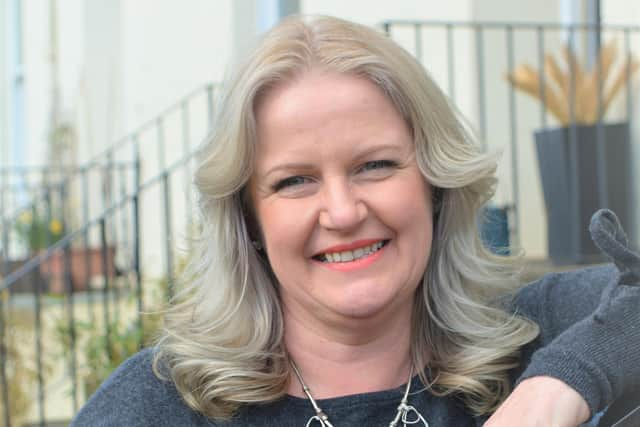Serving Scotland's hospitality staff a much-needed boost - comment
Here I explain more about my motivation behind delivering the programme – and what I discovered along the way.
In December 2020 I was approach by a client who sits on the committee at HIT Scotland, who were looking to deliver a talent development programme for those involved in the Scottish tourism and hospitality industry.
Advertisement
Hide AdAdvertisement
Hide AdThe industry had experienced a tumultuous year due to the pandemic, with venues closed and most hospitality staff having been made redundant or placed on furlough. It was felt that those working within the sector were in desperate need of a boost to their self-esteem, something that would get them mentally fit, re-energise them and their vision of the future, ready to return to the workplace.


Within a month of that initial call, we had designed a ten-week learning journey at three levels – leadership, management and supervisory – and interviewed and contracted 27 trainers from within our network with experience in the hospitality and tourism industries, to deliver the HIT Scotland Tourism and Hospitality Talent Development Programme (THTDP).
Delegates were to include those at grassroots level, right through to senior leaders and company directors, all of whom had been affected by the restrictions imposed during periods of lockdown.
On 16 February this year, we began to onboard the 2,000 selected participants from all sectors of the industry, all of whom were desperate to learn. Content of the ten-week THTDP included inspiring trust, resilience, and wellbeing, clarifying purpose, engagement, unconscious bias, a culture of feedback, decision-making and readiness for change.


While the need to focus on topics such as unconscious bias and resilience has become increasingly apparent, never has it been so critical that these issues are addressed within the industry, so employees are provided with the tools needed to navigate the Covid-19 global pandemic successfully.
Over the ten weeks the trainers worked hard to bring the content to life, engaging delegates and delivering an invaluable learning experience, even to those that initially resisted. The THTDP ended just as the industry began to open its doors in April, and since then the feedback from those who took part in the programme has been overwhelming.
Participants have spoken about how the different modules made them feel valued and supported and that the opportunity came at exactly the right time. The opportunity to work with peers across the industry allowed people to realise they were not alone in their challenges, and that others in their industry shared similar views, concerns, and experiences.
As we all know, the hospitality industry is not for the faint-hearted. Long, unsociable hours, coupled with a fast-paced environment, are all expected for those working in the industry. While many thrive under such pressure, it is these very factors that can have a detrimental impact on mental health and well-being.
Spotlight
Advertisement
Hide AdAdvertisement
Hide AdWhen delivering the HIT Scotland THTDP, we saw first-hand the natural inclination for those within the industry to keep issues related to mental health to themselves. However, the pandemic has inadvertently cast a spotlight on this issue. Employees have had time to reflect on their experience of working within the industry and, in some cases, as businesses have reopened, have reconsidered their career options.
The landscape within the hospitality industry has changed irrevocably. It is experiencing a recruitment crisis as more jobs are advertised, but with fewer experienced people to fill the positions. This has caused additional stresses and strains for managers and leaders within the industry, which, in turn, has a knock-on effect on mental health.
The pandemic has been a wake-up call. Mental health issues cannot just be swept under the carpet, but need to be more openly discussed. I am encouraged by the feedback we’ve received, which shows that businesses are aware of the part they need to play in creating an environment for positive change, to make employees realise that they are not struggling alone.
Emotional resilience after a time of such turbulence is hugely important and is something that managers and leaders should aim to cultivate within their employees. Life has changed significantly since the start of the pandemic; employees need to be given time to adjust to new ways of working. It is equally important that managers can pick up on signs that their staff are not doing so well.
Likewise, employees should be encouraged to take self-care seriously. People have missed the human connection most of all during the pandemic but remember that being surrounded by customers and serving them does not equate to a meaningful human moment.
Fundamentally, investment in people is key. With the industry now open and a recruitment drive in full flow, the offer of a good salary alone does not cut the mustard. Offering quality learning and development – not just on-the-job, technical training – is even more important to those seeking new positions.
As the need for customers and guests through doors has never been greater, there is also a clear need for managers and leaders to create positive working environments. There is a strong link between an upbeat working environment, happy staff, and loyal customers and increased footfall. Put simply, the mental health of employees has never mattered more.
Jane Rennie, chief executive and founder of The Extraordinary Training Company
A message from the Editor:
Thank you for reading this article. We're more reliant on your support than ever as the shift in consumer habits brought about by coronavirus impacts our advertisers.
If you haven't already, please consider supporting our trusted, fact-checked journalism by taking out a digital subscription.
Comments
Want to join the conversation? Please or to comment on this article.
